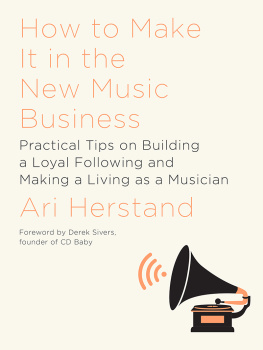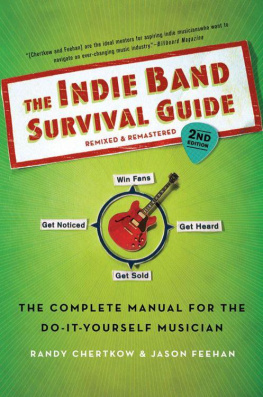Thanks to my dearest Dad and Mom; family; closest friends; UCLA and Musicians Institute staff; USC professors; John and Clare Cerullo, Jessica Burr, Zahra Brown, Wes Seeley, and everyone else at Hal Leonard Performing Arts Publishing Group and Rowman & Littlefield Publishers for understanding my vision and making this book possible.
Thanks to my technical advisors, consultants, focus group members, proofreaders, and close friends, and those directly involved with the development of this book: Michael Eames (president, PEN Music Group, Inc.); Neil J. Gillis (president, Round Hill Music); Kyle Staggs (director, Music Business Affairs at Universal Pictures); Brad Andersen (head of touring, Global Merchandising Services); Bob Fierro (president, Zebra Marketing); Sidney Kibodeaux White (SAG-AFTRA); Stephanie Taub (national director, Sound Recordings, SAG-AFTRA); John Pantle (agent at Sound Talent Group); Justin Paul (founder, Playloop Records); Karl Louis (Moral Compass Management); Aaron Meza (adjunct professor, Musicians Institute); Dina LaPolt (LaPolt Law P.C.); Burgundy Morgan, Esq.; Steven Winogradsky, Esq.; Shawna Hilleary, Esq. (Artist Law Group); Jeff Cohen, Esq. (Millen, White, Zelano, and Branigan); Marty OToole, Esq.; Ben McLane, Esq.; Robert Nathan (law consultant); Ryan D. Kuper (founder, Redemption Records/Balance Entertainment); Britt Draska (consultant and director of royalties, formerly at Lakeshore Entertainment Group); Brian Perera (president, Cleopatra Records); Rob Blasko Nicholson (Mercenary Management, bass player for Ozzy Osbourne); Robert Shahnazarian, Jr. (producer of Killers, Incubus, John Legend, and others); Jeff Weber (Weberworks Entertainment Group); Geza X (producer of Black Flag and others); Samm Brown III (award-winning record producer and songwriter); Michael Levine (Levine Communications Office); Jeff Hinkle (Gudvi, Sussman & Oppenheim); George Fernandez (Deloitte Consulting, certified public accountant); Sharon Gilday (Down to Earth Business Management); Ian Copeland (Frontier Booking International); Michael Laskow (CEO of TAXI); Pascale Halm (director, UCLA Extension); Mike Inez (bass, Alice in Chains); Randy Castillo (drummer, Ozzy Osbourne); Chris Arnstein (tour manager); Don Gorder (chair and founder, Music Business / Management Department, Berklee College of Music); Tony van Veen (CEO, AVL Digital Group, CD Baby, Disc Makers); John Hartmann (former manager of Peter, Paul & Mary; Crosby, Stills & Nash; America; Poco; the Eagles; and others); Chaz Austin (Ed.D.; former career development director, Musicians Institute; author of How to Find Work and Keep Finding Work for the Rest of Your Life); Dan Kimpel (author of It All Begins with the Music: Developing Successful Artists and Careers for the New Music Business); Ira S. Kalb (professor of marketing at the Marshall School of Business at University of Southern California; president, Kalb & Associates); Fred Croshal (Croshal Entertainment Group, LLC); and Mike Gormley (LA Personal Management; former manager of the Bangles, Oingo Boingo, and Danny Elfman).
Thanks to all of the educational institutions that use this book, to my UCLA panelists, and to those from whom I have obtained invaluable advice throughout the years. You know who you are. For a more complete list, see www.bobbyborg.com.
Chapter 1. Pursuing a Career in the New Music Industry:
15 Tips for Career Success
- 1. What is the clique of the future?
- 2. What is the decision-making tree?
- 3. What is the mental-movie method and who created it?
- 4. In regard to paying your dues, it is not always what you ______, but what you ______.
- 5. Explain the Three Magic Os and who created them.
Chapter 2. Band Membership, Part 1:
Formation and Self-Management
- 1. Name at least five places that one might find musicians.
- 2. What is one thing youd include on your criteria for forming list and why?
- 3. What are the five standards necessary to run an effective team? Explain each.
- 4. What is one thing that you think is most helpful in running a successful meeting?
- 5. What is noodling and how can it be bad?
Chapter 3. Band Membership, Part 2:
Partnerships, Trademarks, and Business Entities
- 1. How are partnerships formed?
- 2. State partnership laws vary, but if a group does not have a written band agreement that stipulates anything to the contrary, all members may be presumed to have what?
- 3. Is it necessary for a band to hire an attorney to draft a band membership agreement? Why or why not?
- 4. What is a majority vote? What is a unanimous vote? What is one time you would not use a unanimous vote?
- 5. How might a band handle the rights to its name when it concerns leaving members?
Chapter 4. Contract Employment or Self-Employment, Part 1:
Gigs and Unions
- 1. A freelance musician can generally be described as being what?
- 2. A contract employee can generally be described as being what?
- 3. In what two areas is the distinction between a freelance musician and a contract employee really important?
- 4. What does the AFM stand for and what does it do? What does SAG-AFTRA stand for and what does it do?
- 5. True or false: Instrumentalists who are also vocalists sign up for both AFM and SAG-AFTRA.
Chapter 5. Contract Employment or Self-Employment, Part 2:
Employment Agreements and Negotiations
- 1. What is a buyout?
- 2. What is a per diem?
- 3. What is an incidental?
- 4. What is a retainer?
- 5. Name a few steps one might follow to get an equipment endorsement.
Chapter 6. Contract Employment or Self-Employment, Part 3:
Taxes and Insurance
- 1. What is a 1099 form?
- 2. What is a W-2 form?
- 3. What is a W-4 form?
- 4. Might your accountants services for preparing your taxes be something that you can use to reduce your tax liability?
- 5. In the states where it applies, what benefit does state unemployment provide?
Chapter 7. Solo Artist and Employer:
Pros, Cons, and Responsibilities
- 1. What is one advantage and one disadvantage of going solo? Explain?
- 2. What is a solo artist in disguise?
- 3. What is a leaving member clause and how does it apply to solo artists?
- 4. Explain a work made for hire as it relates to the business responsibilities of a solo artist.
- 5. If all you pay is ___________, all youll get is ___________.
Chapter 8. Entertainment Attorneys:
What They Do and What They Cost You
- 1. An attorney typically receives what percentage of the deals he or she negotiates?
- 2. What are label-shopping agreements? What is the commission an attorney receives under this arrangement? Explain.
- 3. What is a conflict waiver and when is one used?
- 4. Explain the concept of a retainer.
- 5. Explain the process of changing legal representation.
Chapter 9. Personal Managers:
Roles, Options, and Agreements
- 1. The ethical manager typically gets what commission? Are there instances in which the commission may be less or more? Explain.
- 2. What is the name of the clause inserted into management agreements that is intended to limit the royalties a manager gets after the term of your agreement for the deals he or she negotiates, or substantially negotiates, during the term of the agreement?
- 3. In the early stages of your career, what is your most prudent management option?
- 4. The laws in California (and many other states) say that anyone who procures employment must be what? Explain.





